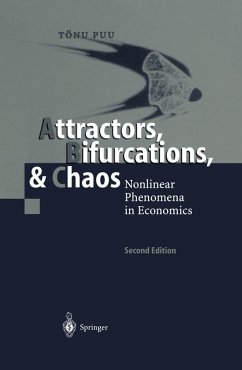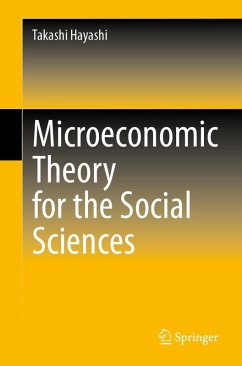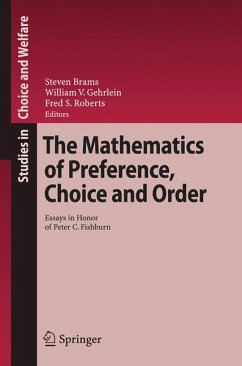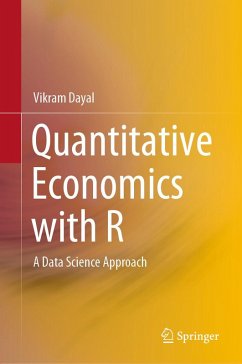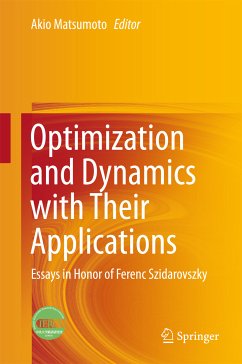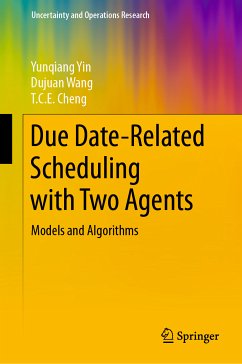
Domain Conditions and Social Rationality (eBook, PDF)
Versandkostenfrei!
Sofort per Download lieferbar
72,95 €
inkl. MwSt.
Weitere Ausgaben:

PAYBACK Punkte
36 °P sammeln!
This book primarily focuses on the domain conditions under which a number of important classes of binary social decision rules give rise to rational social preferences. One implication of the Arrow and Gibbard theorems is that every non-oligarchic social decision rule that satisfies the condition of independence of irrelevant alternatives, a requirement crucial for the unambiguity of social choices, and the weak Pareto criterion fails to generate quasi-transitive social preferences for some configurations of individual preferences. The problem is exemplified by the famous voting paradox associ...
This book primarily focuses on the domain conditions under which a number of important classes of binary social decision rules give rise to rational social preferences. One implication of the Arrow and Gibbard theorems is that every non-oligarchic social decision rule that satisfies the condition of independence of irrelevant alternatives, a requirement crucial for the unambiguity of social choices, and the weak Pareto criterion fails to generate quasi-transitive social preferences for some configurations of individual preferences. The problem is exemplified by the famous voting paradox associated with the majority rule. Thus, in the context of rules that do not give rise to transitive (quasi-transitive) social preferences for every configuration of individual preferences, an important problem is that of formulating Inada-type necessary and sufficient conditions for transitivity (quasi-transitivity).
This book formulates conditions for transitivity and quasi-transitivity for several classes of social decision rules, including majority rules, non-minority rules, Pareto-inclusive non-minority rules, and social decision rules that are simple games. It also analyzes in detail the conditions for transitivity and quasi-transitivity under the method of the majority decision, and derives the maximally sufficient conditions for transitivity under the class of neutral and monotonic binary social decision rules and one of its subclasses. The book also presents characterizations of some of the classes of rules for which domain conditions have been derived.
The material covered is relevant to anyone interested in studying the structure of voting rules, particularly those interested in social choice theory. Providing the necessary social choice theoretic concepts, definitions, propositions and theorems, the book is essentially self-contained. The treatment throughout is rigorous, and unlike most of the literature on domain conditions, care is taken regarding the number of individuals in the 'necessity' proofs. As such it is an invaluable resource for students of economics and political science, with takeaways for everyone - from first-year postgraduates to more advanced doctoral students and scholars.
This book formulates conditions for transitivity and quasi-transitivity for several classes of social decision rules, including majority rules, non-minority rules, Pareto-inclusive non-minority rules, and social decision rules that are simple games. It also analyzes in detail the conditions for transitivity and quasi-transitivity under the method of the majority decision, and derives the maximally sufficient conditions for transitivity under the class of neutral and monotonic binary social decision rules and one of its subclasses. The book also presents characterizations of some of the classes of rules for which domain conditions have been derived.
The material covered is relevant to anyone interested in studying the structure of voting rules, particularly those interested in social choice theory. Providing the necessary social choice theoretic concepts, definitions, propositions and theorems, the book is essentially self-contained. The treatment throughout is rigorous, and unlike most of the literature on domain conditions, care is taken regarding the number of individuals in the 'necessity' proofs. As such it is an invaluable resource for students of economics and political science, with takeaways for everyone - from first-year postgraduates to more advanced doctoral students and scholars.
Dieser Download kann aus rechtlichen Gründen nur mit Rechnungsadresse in A, B, BG, CY, CZ, D, DK, EW, E, FIN, F, GR, HR, H, IRL, I, LT, L, LR, M, NL, PL, P, R, S, SLO, SK ausgeliefert werden.




